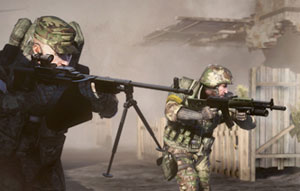US Army softens training to recruit more from Generation - G

Real war and virtual war just got closer.
Basic training is about to get more advanced. And recruits can thank games for that. Generation G (Gamers) did what Generation X and Generation Y were unable to achieve!
In an interview with Lt. Gen. Mark Hertling, NPR reports that the U.S. Army is altering its basic training program for the first time in 20 years, in part to better train recruits weaned on video games.
"This isn't a decline in our recruits; this is a decline in our American society in terms of their physical capacity," Hertling told NPR. "It's just a softer generation."
Hertling goes on to explain that while new soliders are "advanced in terms of their use of technology," they're perhaps "not as advanced in their physical capabilities or ability to go into a fight. So we're taking that into consideration as well in doing this holistic review of how we do training."
So what's in store for new recruits? Hertling says the new basic training regimen will focus more on teaching recruits essential combat skills, from the use of "weapons, knives, bayonets, [and] sticks" to hand-to-hand techniques like punching, kicking, and martial arts. His aim is to better prepare them for the potentially grueling physical experience of serving in unfriendly environments.
That includes an added emphasis on discipline, which Hertling contends just isn't what it used to be.
"We certainly have a generation that is not as disciplined when they enter the military," he said, adding that while the new generation has "what they believe is a form of courage or discipline, it's not what we expect of a soldier in very tense and difficult situations."
The news comes just weeks after the Pentagon announced plans to fund new research into using games to train soldiers. The Army in particular has had a healthy working relationship with the games industry; its freely-distributed first-person shooter America's Army has enjoyed great success as a recruitment tool.
While Hertling isn’t enamored with their physical prowess, he believes new soldiers with a background in games do offer one distinct advantage.
"They're different. They have a technology edge. I think they're smarter than any generation we've ever had before," he said. "They certainly ask a lot more difficult questions."